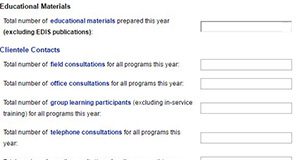Each fall UF/IFAS faculty are asked to report on their Extension activities and accomplishments over the past year, including the contact made with Extension clientele through both direct and indirect methods. This five-page fact sheet describes how to report these interactions in Workload. Written by Diane Craig and Glenn D. Israel and published by the Department of Agricultural Education and Communication.
http://edis.ifas.ufl.edu/wc058
Tag: Diane Craig
Using Secondary Data to Build Strong Extension Programs (PEOD10/PD010)
 In planning extension programming, collecting and analyzing information about client needs can be expensive and time consuming. This 4-page fact sheet describes the benefits and limitations of using secondary data, how to evaluate it, and ways to locate quality secondary data. Written by Cheri Winton Brodeur, Glenn D. Israel, and Diane D. Craig, and published by the UF Department of Agricultural Education and Communication, October 2011.
In planning extension programming, collecting and analyzing information about client needs can be expensive and time consuming. This 4-page fact sheet describes the benefits and limitations of using secondary data, how to evaluate it, and ways to locate quality secondary data. Written by Cheri Winton Brodeur, Glenn D. Israel, and Diane D. Craig, and published by the UF Department of Agricultural Education and Communication, October 2011.
http://edis.ifas.ufl.edu/pd010
AEC377/WC058 Reporting Clientele Contact in Workload
Revised! AEC377, a 7-page illustrated fact sheet by Diane D. Craig, Bryan D. Terry, and Glenn D. Israel, describes for UF/IFAS Extension faculty how the WORKLOAD application should be used to report Extension contacts. Includes references. Published by the UF Department of Agricultural Education and Communication, November 2009.
http://edis.ifas.ufl.edu/wc058
